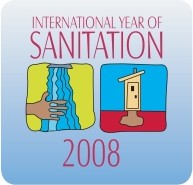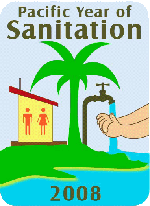The International Year of Sanitation
 As member of the global Water Supply and Sanitation Collaborative Council (WSSCC), the Pacific Islands Applied Geoscience Commission (SOPAC) has mobilised partners in the region to coordinate activities in the Pacific region on water supply, sanitation and hygiene (WASH) and established the Pacific WASH Coalition.
As member of the global Water Supply and Sanitation Collaborative Council (WSSCC), the Pacific Islands Applied Geoscience Commission (SOPAC) has mobilised partners in the region to coordinate activities in the Pacific region on water supply, sanitation and hygiene (WASH) and established the Pacific WASH Coalition.The International Year of Sanitation 2008, creates an excellent opportunity to strengthen collaboration between a wide range of regional and international agencies to improve delivery of water supply, sanitation and hygiene activities. Partners in the Coalition include the Foundation of the Peoples of the South Pacific International (FSPI), the Fiji School of Medicine (FSMed), Live and Learn Environmental Education (LLEE), the World Health Organization (WHO), the United Nations Children’s Fund (UNICEF) and the International Federation of Red
 Cross (IFRC). Increasing interest in water and sanitation support provided to the region by donors and other organisations resulted in a large number of overlapping interventions and it becomes increasingly important to ensure that work carried out on this area is well coordinated in order to avoid duplication. The Pacific WASH Coalition is utilising existing partnerships such as established under the Pacific Partnership Initiative on Sustainable Water Management) and is building on ongoing work programmes and activities in Pacific island countries.
Cross (IFRC). Increasing interest in water and sanitation support provided to the region by donors and other organisations resulted in a large number of overlapping interventions and it becomes increasingly important to ensure that work carried out on this area is well coordinated in order to avoid duplication. The Pacific WASH Coalition is utilising existing partnerships such as established under the Pacific Partnership Initiative on Sustainable Water Management) and is building on ongoing work programmes and activities in Pacific island countries.Along with ongoing advocacy and programmes implemented by the Pacific WASH Coalition, further WASH activities in line with the International Year of Sanitation include:
TONGA: Key activities include Training of Trainers workshops on water quality, rainwater harvesting and sanitation and hygiene, school WASH and media campaigns.
TUVALU: Activities include conducting a series of school workshops on water, sanitation and hygiene, translation and dissemination of rainwater harvesting manual and media campaign.

















